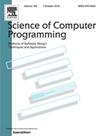Ranking co-change candidates suggested by FLeCCS using programmer sensitivity
IF 1.4
4区 计算机科学
Q3 COMPUTER SCIENCE, SOFTWARE ENGINEERING
引用次数: 0
Abstract
Identifying co-change candidates when making changes to a particular program entity is an important software engineering task which is known as change impact analysis. A number of techniques for detecting co-change candidates currently exist. Most of these techniques work considering file level, class level, or method level granularity. FLeCCS is a recently introduced technique that suggests co-change candidates considering even fragment level granularity. FLeCCS ranks its co-change candidates considering file proximity. However, programmer sensitivity might be an important factor while ranking co-change candidates. Intuitively, it is more comfortable for a programmer to change her own code rather than changing someone else's code. Considering this fact, we investigate ranking co-change candidates suggested by FLeCCS considering programmer sensitivity.
In our research, we have two main contributions: (1) proposing a composite ranking mechanism considering three things - file proximity, code similarity, and programmer sensitivity and (2) an empirical evaluation of our proposed mechanism by comparing it with file proximity ranking and similarity extent ranking mechanisms on thousands of revisions of five subject systems. We compare the ranking mechanisms in ranking the co-change candidates suggested by FLeCCS. According to our investigation incorporating four measures (Precision At K, Recall At K, Mean Average Precision and Mean Reciprocal Rank), composite ranking mechanism significantly outperforms the other two existing ranking mechanisms. Our findings are supported by statistical significance tests. We believe that our Proposed Composite Ranking mechanism is not only applicable to FLeCCS but also to other co-change suggestion techniques.
利用程序员敏感度对 FLeCCS 提出的共同变更候选方案进行排序
在对特定程序实体进行更改时,识别共同更改候选对象是一项重要的软件工程任务,也就是所谓的更改影响分析。目前有许多检测候选共变的技术。这些技术大多考虑文件级、类级或方法级粒度。FLeCCS 是最近推出的一种技术,它甚至考虑到片段级粒度,提出共同变更候选方案。FLeCCS 会根据文件的接近程度对共同更改候选对象进行排序。不过,程序员的敏感性可能是共同更改候选文件排序的一个重要因素。从直觉上讲,程序员更愿意修改自己的代码,而不是修改别人的代码。考虑到这一事实,我们研究了在考虑程序员敏感性的情况下对 FLeCCS 建议的共同变更候选对象进行排序的问题。在我们的研究中,我们有两个主要贡献:(1) 提出了一种考虑文件邻近性、代码相似性和程序员敏感性这三个因素的复合排序机制;(2) 通过在五个主题系统的数千次修订中将我们提出的机制与文件邻近性排序机制和相似性程度排序机制进行比较,对我们提出的机制进行了实证评估。我们比较了 FLeCCS 提出的共同变更候选排序机制。根据我们采用四种衡量标准(K 值精度、K 值召回率、平均精度和平均互易等级)进行的调查,复合排序机制明显优于其他两种现有排序机制。我们的发现得到了统计显著性检验的支持。我们相信,我们提出的综合排名机制不仅适用于 FLeCCS,也适用于其他共变建议技术。
本文章由计算机程序翻译,如有差异,请以英文原文为准。
求助全文
约1分钟内获得全文
求助全文
来源期刊

Science of Computer Programming
工程技术-计算机:软件工程
CiteScore
3.80
自引率
0.00%
发文量
76
审稿时长
67 days
期刊介绍:
Science of Computer Programming is dedicated to the distribution of research results in the areas of software systems development, use and maintenance, including the software aspects of hardware design.
The journal has a wide scope ranging from the many facets of methodological foundations to the details of technical issues andthe aspects of industrial practice.
The subjects of interest to SCP cover the entire spectrum of methods for the entire life cycle of software systems, including
• Requirements, specification, design, validation, verification, coding, testing, maintenance, metrics and renovation of software;
• Design, implementation and evaluation of programming languages;
• Programming environments, development tools, visualisation and animation;
• Management of the development process;
• Human factors in software, software for social interaction, software for social computing;
• Cyber physical systems, and software for the interaction between the physical and the machine;
• Software aspects of infrastructure services, system administration, and network management.
 求助内容:
求助内容: 应助结果提醒方式:
应助结果提醒方式:


